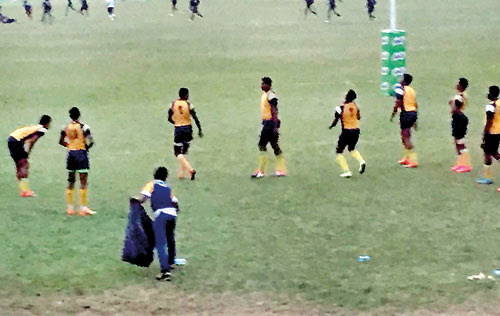Sports and social responsibilities
View(s): “Sports have this enormous capacity, to really make an important contribution. And we should be severely criticized if we don’t take advantage of it. We should be talking about it as an obligation.” said NBA Commissioner David Stern. It has been said that there’s one thing we know for sure society needs more from sports than a bunch of teams playing games. One might say that sports have rules and regulations to addresses issues. Compliance and penalty systems though important are not enough. It is also about doing right of being socially responsible. Socially conscious sports administrators cannot separate what is happening in society with what is taking place in sports.
“Sports have this enormous capacity, to really make an important contribution. And we should be severely criticized if we don’t take advantage of it. We should be talking about it as an obligation.” said NBA Commissioner David Stern. It has been said that there’s one thing we know for sure society needs more from sports than a bunch of teams playing games. One might say that sports have rules and regulations to addresses issues. Compliance and penalty systems though important are not enough. It is also about doing right of being socially responsible. Socially conscious sports administrators cannot separate what is happening in society with what is taking place in sports.
Teams and sports administrators need to take a hard look at sport through the lens of social consciousness. They need to ask — How are we doing? What can we do to be more socially responsible? What is happening when it comes to competing – is to look for winning players and coaches and to improve facilities? We do those things, and more, including the cat calls jeering and the piercing hit (gahapan) and kill (marapan) often shouted in Sinhala, to improve on-field performance. It is expected it is demanded. Fans demand more from their teams and it is all about winning.
How can we raise the bar in sports to meet what is required today and just not in terms of winning? It will come by expanding the definition of “success”. One pathway is to adapt templates used in business; “success’ is measured in multiple ways. The conventional bottom line in business is profits-profitability. But more and more companies are restructuring operations to manage what is called “The Triple Bottom Line”. That means giving attention simultaneously to three things, “the three Ps,” namely, Profits, People, and Planet. Return-on-investment the gold standard is still important, but people are making socially responsible investments by putting personal values to work.
Socially responsible investing will screen companies to make investment choices. E.g. no to investing in companies that manufacture guns or those involved with drugs, but yes to investing in companies that generate clean energy. Socially responsible investing is not a matter of choosing values over financial returns; it fuses values and returns. Can we extend this to sport and especially to schools rugby? It would involve nurturing multiple outcomes — Winning, Integrity, Social Responsibility and Community Responsiveness. What does the Report Card look like today? Social responsibility gets the lowest grade because social responsibility is not about “traditional stuff” in sports, things like game plans winning and in most case about emotion form affiliation.
 Social responsibility is about who we are, what we value, and what we stand for as a people and how those stances translate in sports. Stepping up to the challenge will require a new breed of administrators — those adept at making teams competitive, managing finances, and raising the bar of social responsibility. We have had great successes in the past. There’s one thing we know for sure: society needs more from rugby than a bunch of teams playing games. I was much taken up with St. Peter’s Under-16 team where after a match or pre-match warm up there were players of the bench who would collect all the bottles and bottle tops and other garbage and take it to the bin. I thought this was an inculcation of being responsible to society where people are taught and the planet is helped.
Social responsibility is about who we are, what we value, and what we stand for as a people and how those stances translate in sports. Stepping up to the challenge will require a new breed of administrators — those adept at making teams competitive, managing finances, and raising the bar of social responsibility. We have had great successes in the past. There’s one thing we know for sure: society needs more from rugby than a bunch of teams playing games. I was much taken up with St. Peter’s Under-16 team where after a match or pre-match warm up there were players of the bench who would collect all the bottles and bottle tops and other garbage and take it to the bin. I thought this was an inculcation of being responsible to society where people are taught and the planet is helped.
It is a great way to make the young sportsman understand their role in giving more to than being just a bunch playing a game with only a win in mind. At the last Under-14 tournaments played at Havelock Park the referees did a safety check in the early part of the second day. They collected a few plastics bottles and over 30 water bottle caps form the field. Imagine what would happen to a player if he falls and hits his face on the open side up bottle cap. It is indeed a common sight to see water bottles being taken to the field and you take a sip and throw out the bottle. What does it do to the Planet? Then see the way they throw the caps? What will happen to a player who falls on it? More issues of responsibility come when under age players are played with the bigger boys.
It is about winning and a coach’s job. Look at the safety priority of World Rugby in age group and the aspects of player welfare. Look at what happens when there are no medics and games gate late. Finals are played in fading light and called off before time expires. Safety is important and not the cup. That is where you need a new thinking than only filling records. I am also happy the positive response of Ananda College about whose ground this column commented on and the need to get the best of a valuable property and the investment. I was told that they will talk to the SLRFU and get the best advice and proceed. That is what is about the new responsibility. Vimal Perera is a former Rugby Referee, coach and Accredited Referees Evaluator IRB


